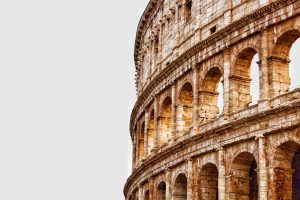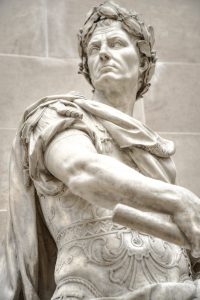
On February 29th, 2020 the governor of the State of Washington declared a state of emergency in response to the Covid-19 virus. Based on his actions over the ensuing months some have described the governor as dictator, tyrant, king, and emperor. I wish to set aside the frustration-filled rhetoric and examine the relationship between dictatorship and emergency powers.
When In Rome

Consider Rome around 510 – 31 BC. Theirs is a good study as an early, fairly successful republic. Rome began as a monarchy, but it didn’t take long for the Romans to overthrow that in favor of a republic. One element of their republic was the establishment of dictators, whose function paralleled emergency powers we see today. Emergencies were equally or more common in those days than in ours, and when the odd crisis popped-up those old Romans would appoint someone dictator.
These dictators had absolute authority in Rome and ruled through proclamation–dictator literally being “one who dictates.” In this case, one who dictates laws. In early uses of the Roman dictatorship, the dictator’s power typically was set to expire after 6 months. The dictatorship ended earlier if the appointed dictator laid that authority down when the emergency had passed, at which point control over the country reverted again to the representatives of the people.
As you can imagine, while a dictator was active in Rome the elected representatives served no meaningful purpose. A representative governing body is a useless appendage when a dictator is the helm. Neither were the existing laws of Rome safe. A dictator had authority to overrule any current law while the dictatorship was in effect—all in the name of the emergency, you understand.
When the people were lucky, the appointed dictator peacefully stepped down at the end of the allotted time.
(Most of you are now thinking, “hmmm, I bet this arrangement didn’t end well.”)
Shocker, eventually corrupt men figured out how to use the dictatorship system to take and keep power—because it is good to be king, even when your system of government disavows kingship.

A series of questionable dictatorships destabilized the country to the point that many once-valued government functions were neglected. Elected officials grew cowardly or lazy (or both). Political infighting ground government to a halt, violence was common on the streets, laws were often determined by bribery or cronyism.
Into this clunky, corrupt system stepped Julius Caesar, who combined adept crisis opportunism with intimidation of the Senate and got himself named dictator for ten years. Followed by–you guessed it–dictatorship for life. Turns out that the longer a person wields absolute power the more reluctant they are to give it up.
While that was not the end of the Roman Empire, it was the end of the Roman Republic in any meaningful sense.
A Republic In Name
Washington, like other states and the country itself, is a constitutional republic. We elect people to represent us as a governing body in either the legislature or the senate. Those groups create laws for the state, but those laws are constrained by the Washington State constitution. The governor, as the head of the executive branch, is charged with enforcing those laws. In a republic, contrary to widespread public ignorance, the executive (governor, president) does not make laws.
How does Washington’s natural state as a constitutional republic different from its current state during the covid-19 outbreak? Here are some points consider from our Roman friends.
A dictator is not answerable to any authority during the dictatorship.
In Washington it is well known that the governor has not been responsive to either the people or the legislature. More than that there is no court in Washington that has yet put a check on his control—not because his actions don’t destroy constitutional rights (they clearly do), but because the courts believe that state law allows him to do whatever he pleases in the name of the “emergency.” And, you know, there is a virus out there. (I will have more to write in the future about the failures of our judiciary system.)
A dictator can assume power through seemingly legitimate legal mechanisms.
Seizing dictatorial power does not require a violent or military takeover. Most dictatorships historically started with legal legitimacy at first, or at least some sheen of it. In Washington’s case, the state’s emergency powers laws are the mechanism of dictatorial governance.
A dictator has total authority; that is, his authority is not limited to actions taken to mitigate the crisis.
This is an important distinction as it is the difference between using emergency powers for crisis management vs. dictatorship. In Washington the most striking example is a recent one. Just in time for election season the governor struck down the entire Public Records law via Proclamation (20-64). This action accomplishes little related to the covid-19 emergency but was made all the same in the emergency’s name.
A dictator’s actions are not bound by existing laws.
Washington’s governor has already demonstrated that no existing state law is safe from modification or cancellation at his whims. Dozens have been modified or suspended since February. Even the emergency powers laws that he has used to claimed his dictatorship are not being followed. Right after Washington State law describes the conditions of emergency powers it describes extra penalties for destruction of property and personal injury during the state of emergency. These requirements are on the very next page of the same law (RCW 43.06.230).
Washington’s governor is very actively interested in the powers that come with the emergency, but he is seemingly not interested in and has not (to my knowledge) once been asked to address the neglect of the rest of the state of emergency requirements—particularly in light of the violence and destruction common lately in our larger cities.
If It Acts Like A Duck…
Current state laws can be changed or cancelled without notice. The citizens are governed by proclamation from a single person who possesses absolute authority unchecked by the legislature. Existing state laws inconvenient to that authority are either ignored with impunity or suspended altogether by proclamation. The rule-by-proclamation is not confined to a specified area experiencing a state of crisis, but instead applies to the entire state regardless of conditions in each local area.
This is not a monarchy and should not be described as one, but it certainly is not a constitutional republic.
Washington currently is functioning as a dictatorship.
History has shown us that sometime dictatorships work out OK in the end—when the people are lucky the dictator has laid down his power at the allotted time. In many cases the dictatorship ended but destabilized the country.
In many cases the dictatorship did not end until the country itself was destroyed or subdued.
I hope for Washington’s sake that our dictatorship ends soon.
As a final thought, the Romans had at least one advantage to Washington State in that their various dictators were appointed by representatives of the citizens, who also determined the time that the dictatorship would remain in effect. Under current Washington law our governor is the sole determiner of when to take up dictatorship and how long his own dictatorship will last.
It is hard to see how this is a good and safe law for free people to live under regardless of who your governor may be. If you have not already do so, consider looking up WA Initiative 1114 and judge for yourself if you prefer the corrections it provides over our current situation.
I certainly do.
4 Thoughts on “Covid Coup: The Suspension of the Washington Republic”